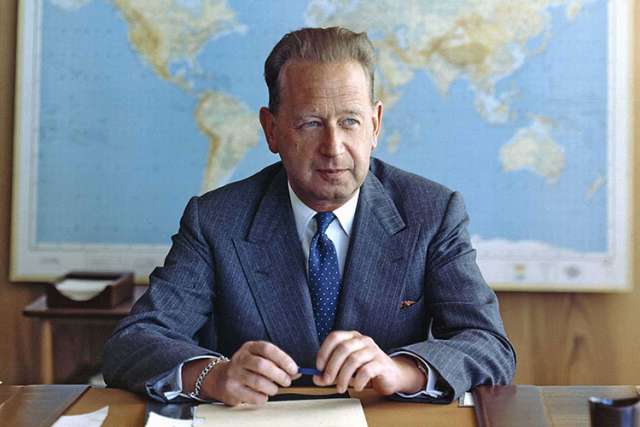Dag Hammarskjold, the former Secretary-General of the United Nations, wrote those words and they highlight part of the deeper intentionality of sexual desire. And this insight was more than just a theoretical one for Hammarskjold. He knew loneliness and unfulfilled desire.
As more and more of his journals are published in English, we are becoming more aware that Hammarskjold was both a man of extraordinary moral integrity and extraordinary spiritual depth. And he came by it legitimately. His father, at one time the prime minister of Sweden, had been a great statesman of uncompromising integrity and his mother had been a woman of great warmth and spiritual depth. Hammarskjold inherited the best of both, and it made him both a rare statesman and a great spiritual writer. However, not everything was whole in his life.
While in his professional life he dealt with issues of world importance and was taxed for every ounce of his energies, the rest of his life was not nearly so complete. As a young man, he had lost a woman he deeply loved to another man, and this was a wound that never left him. He never dated or pursued marriage again. He longed to be married, but, for all kinds of reasons, as is the case for millions of people, it just never happened. He was, in the words of his biographer, Walter Lipsey, “checkmated rather than mated.”
Hammarskjold, in his journals, often reflects on this “checkmate” and upon the lacuna it left in his life. There’s a searing honesty about its pain and about how he tries to grapple with it. On the one hand, he is clear that this is a pain that cannot be denied and which never goes away; on the other hand, he is able to redirect it somewhat, sublimating it into a wider embrace, into a different kind of marriage bed:
“I feel pain, a longing to share in this embrace (of a husband and wife), to be absorbed, to share in this encounter. A longing like carnal desire, but directed toward earth, water, sky and returned by the whispers of the trees, the fragrance of the soil, the caresses of the wind, the embrace of water and light.” Was this satisfying? Not quite, but it brought a certain peace: “Content? No, no, no — but refreshed, rested, while waiting.”
In this, both in how he experienced the pain of his inconsummation and in how he tried to redirect those longings, his feelings parallel those of Thomas Merton. Merton was once asked by a journalist how he felt about celibacy. Merton replied that “celibacy was hell,” that it condemned one to live in a loneliness that God Himself condemned (“It is not good for the man to be alone”), and that it was in fact a dangerous way to live since it was an abnormal way of living. But Merton then went on to say that, just because it was anomalous and dangerous, didn’t mean that it couldn’t be wonderfully generative and life-giving, both for the one living it as well as for those around him or her. And that was no doubt true in Merton’s own case, just as it was true for Hammarskjold. Both infused more oxygen into the planet.
Moreover, Merton tried to sublimate his desire for a marriage bed in much the same way as Hammarskjold did: “I had decided to marry the silence of the forest. The sweet dark warmth of the whole world will have to be my wife. Out of the heart of that dark warmth comes the secret that is heard only in silence, but it is the root of all the secrets that are whispered by all the lovers in their beds all over the world.”
Both Hammarskjold and Merton longed for that deep, highly individualized, intimate and sexual, one-to-one embrace which was denied them by their place in life and which is denied to millions of us by every sort of circumstance and conscription. Merton chose to forego sexual consummation deliberately, to embrace religious vows; Hammarskjold had it chosen for him, by circumstance. At the end of the day the effect was the same. Both then tried to sublimate that need and desire for congenital intimacy by, in their own words, somehow marrying the world and making love in a less-particularized way.
Many married persons who enjoy that unique depth of oneto- one intimacy that Hammarskjold and Merton longed for must, I suspect, inchoately also long to find within their sexual intimacy that wider embrace of which Hammarskjold and Merton speak, knowing that they want that too in their sexual embrace. Thinkers have forever mulledover the problem of the one and the many, the interrelationship between the particular and the universal, because this isn’t just a theoretical issue in metaphysics, something to entertain philosophers, it’s also something that lies inextricably entangled within the powerful pressure of sexuality in lovers in their beds all over the world.
(Fr. Rolheiser can be reached at www.ronrolheiser.com.)


